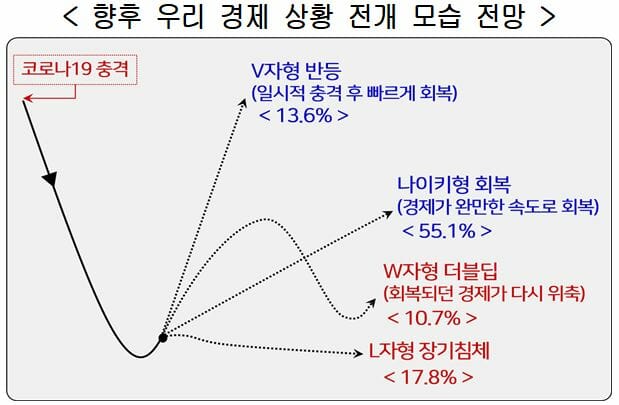
Economic experts forecast the average of the domestic economic growth rate this year to be 2.4%, which is more conservative than major domestic and foreign institutions. The economic shock caused by Corona 19 was similar to the IMF foreign exchange crisis, and it was found to be feeling about 30% larger than the global financial crisis. Regarding the future economic situation, more than half of experts predicted that the recovery would recover at a moderate pace.
The Korea Employers Association announced on the 10th that as a result of conducting a survey of 214 economic experts (based on respondents) of experts’ opinions on economic outlook and major economic issues in 2021, the average of the respondents’ 2021 economic growth rate forecast was 2.4%. did.
Respondents were found to be more conservatively forecasting the Korean economic growth rate (2.4% on average) in 2021 than major domestic and foreign institutions. The average estimates of major institutions are ▲Bank of Korea 3.0% ▲KDI 3.1% ▲OECD 2.8%.
Regarding the future Korean economic situation, the response of’Nike-type recovery (the economy recovers at a gentle pace)’ was the highest at 55.1%. The survey was followed by 17.8% of the’L-shaped long-term recession’, 13.6% of the’V-shaped rebound (recovering quickly after a temporary shock)’, and 10.7% of the’W-shaped double dip (the recovered economy again contracts)’.
In addition, it was found that respondents felt about the degree of economic shock experienced by the Corona 19 crisis at a level similar to that of the IMF foreign exchange crisis, 30% greater than the global financial crisis. The shock experience was evaluated by assuming that the IMF foreign exchange crisis and the global financial crisis had an impact on the Korean economy of 100 respectively, and the impact of the economic experience caused by the Corona 19 crisis was compared with this.
Regarding the stance of the 21st National Assembly’s national fiscal management, 48.1% of the respondents said,’Financial expansion is necessary but should be kept to a minimum.’ There were also respondents such as’It is necessary to maintain balanced finance’ (22.4%),’We need to expand more than the recent trend’ (21.5%), and’Austerity finance is necessary’ (7.9%).
Regarding the direction of industrial restructuring, 49.3% of respondents answered that’the government should minimize intervention and leave it to the market.’ Gyeong-Chung explained, “Experts are presumed to recognize that’private-led’ restructuring is necessary rather than’government-led’ to improve the fundamental constitution of the industry beyond corporate revival.”

Regarding the highest inheritance tax rate, 55.9% of respondents answered that’reduction is necessary in order to ensure the permanence of corporate management’, and responses such as’maintaining the current level’ (26.3%). Regarding the highest corporate tax rate, 46.0% of respondents answered that’there is a need to cut in order to secure international competitiveness’.
Compared to President Trump’s re-election, US Candidate Biden’s impact on the Korean economy is the highest with 59.3% of respondents saying,’There is a difference by industry, but the impact on the overall economy will not differ significantly.’ In addition, 36.0% of’positive effects’ and 4.7% of’negative effects’ were surveyed.
The main factors that have a positive effect were’Global export increase’ 67.5%,’US export increase’ 24.7%, and’New business opportunity expansion’ 6.5%.
